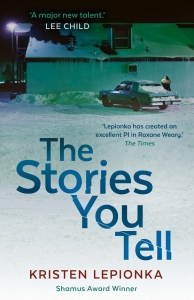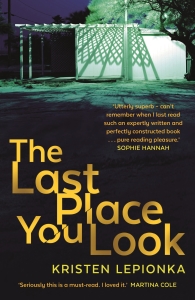The Stories You Tell – Kristen Lepionka
 After a remarkable debut (‘The Last Place You Look’) and an accomplished second novel (‘What You Want to See’), young US author Kristen Lepionka has produced a brilliant third instalment of the adventures of private investigator Roxane Weary with her latest novel, ‘The Stories You Tell’.
After a remarkable debut (‘The Last Place You Look’) and an accomplished second novel (‘What You Want to See’), young US author Kristen Lepionka has produced a brilliant third instalment of the adventures of private investigator Roxane Weary with her latest novel, ‘The Stories You Tell’.
Set in Columbus, Ohio, like the first two novels in the series, ‘The Stories You Tell’ is entertaining, energetic, thoughtful and thoroughly gripping. Its narrative scope exceeds the boundaries of cleverly done genre fiction, and resonates with insights into contemporary life, dealing frankly with themes ranging from sexuality to dysfunctional families, from the unsavoury side of social media to racial bias and the daily adversities faced by the many who ‘just manage’ to cope with the economics of modern life.
First and foremost, ‘The Stories You Tell’ is top-notch crime fiction, with a protagonist, feisty private investigator Roxane Weary, whom Lepionka is developing novel after novel with skill and patience. Roxane, the daughter of hero cop and troubled father Frank, who died in the line of duty nearly two years before the story starts, finds herself plunged into a troublesome case when her brother Andrew, a bartender and occasional drug dealer, calls her to his home at 3 a.m. on a freezing January night. He’s had a disturbing encounter with a former girlfriend, Addison, who showed up at his flat asking for help in the middle of the same night, refused to explain her evident distress, called her father from Andrew’s phone, and then left abruptly.
Roxane starts searching for Addison, and it’s soon clear that she has disappeared: her flatmate hasn’t seen her in days, and tells Roxane of a cop, Mickey Dillman, who showed up at the house looking for Addison the morning after she rushed to Andrew’s. Also gone awol is Wyatt, a gentle, black gay man and a bouncer at the rather disreputable nightclub where Addison plied a not very rewarding career as DJ. The nightclub owner himself seems to have gone off the grid too, as Roxane learns from his furious girlfriend. Eventually, Roxane and Andrew notify the police about Addison, aware that the finger of suspicion could point to Andrew himself – as it duly does, complicated by the fact that the police move swiftly in on Andrew and discover a small cache of marijuana he didn’t have time to dispose of at his house.
The reason for the Columbus PD’s energy in pursuing what might or might not be a missing person case is soon obvious: the day after Roxane started hunting for Addison, Mickey Dillman’s body was fished out of the Scioto river, a death that could be an accident, suicide or even murder. The police are now aware there could be a link between Addison’s disappearance and Dillman’s death, while Roxane has an even stronger incentive in investigating the missing DJ’s whereabouts: her brother Andrew is still in custody, suspected of foul play where Addison is concerned and, as Roxane discovers to her dismay, charged with parole violation over a previous drugs-related offence.
In just a few chapters, Lepionka constructs a labyrinthine plot with a whole set of interesting ramifications. As in her previous novels, she does so by timing the story faultlessly, by razor-sharp dialogue and above all by clever characterisation. Each and every member of the novel’s cast, irrespective of the part they play in the story, is a stand-out 3D creation within the story’s colourful canvas. Lepionka has an unerring eye for the nuances of personality and circumstance that make her story’s characters genuinely interesting people, rather than mere props in a plot. And she has the ability to portray them whole, with their aspirations and dislikes, with their small triumphs and petty failings, irrespective of whether she’s writing about investigators or witnesses, victims or villains.
I find this ability, and the unaffected, effortless way Lepionka deploys it, one of the strongest assets of ‘The Stories You Tell’– though the author of course does a first-rate job at disguising the real villains, orchestrating a plot that keeps surprising the reader to the very end. And while the story is undoubtedly driven by the collective narrative merit of the characters who inhabit it, it’s also clear that Roxane Weary has grown into a fictional character of true stature.
Lepionka brilliantly weaves the story of Roxane the PI, stubborn and compassionate in equal measure, striving to work at the only job she knows she can do despite the costs for her and those close to her, together with the story of Roxane the daughter of Frank and Genevieve and sister of Andrew and Matt – a family still reeling from the impact of Frank’s death – of Roxane the lover of enigmatic, mercurial artist Catherine, of Roxane the close friend/occasional lover of detective Tom Heitker, Frank Weary’s old partner, of Roxane the friend of young Shelby, who’s recently come out as gay and has a troubled relationship with her father, one that echoes in part the relationship between Roxane and Frank.
These are only some of the inhabitants of the fascinating fictional landscape of ‘The Stories You Tell’. Ordinary people who find themselves in extraordinary circumstances, whose lives clearly matter to Lepionka as an author and, consequently, are made to matter to her readers. Whether the latter are looking for a smart, gripping crime novel, or an acute insight in the lives of ‘normal’ people in ‘normal’ contemporary America, they won’t be disappointed. I for one clearly was not, and look forward for the next chapter in the story of Roxane Weary, PI.




